A Conversation with AAPI Trailblazers in the Cannabis Industry

This May, we’re observing Asian American and Pacific Islander Heritage month, which celebrates the contributions of the AAPI community in the United States. At a time when Asian Americans are the victims of targeted racial attacks, we’d like to reaffirm our solidarity and use this month to uplift our many AAPI-owned brands. Throughout the rest of the month, Sava is excited to showcase the stories and products from our AAPI-owned brands on our blog, social media, and newsletters.
Sava is proud to offer products from eleven AAPI-founded brands: Potli, Mellows, Sundae School, Mad Lilly, TSO Sonoma, Moon Made Farms, Elefante, Kin Slips, Nouera, Gift of Doja, and Biko.
As part of our celebration, we sat down with the founders of our AAPI-founded brands for a chat about being AAPI in the cannabis industry, how they're working to reverse the stigma around the plant, and their AAPI-inspired products.
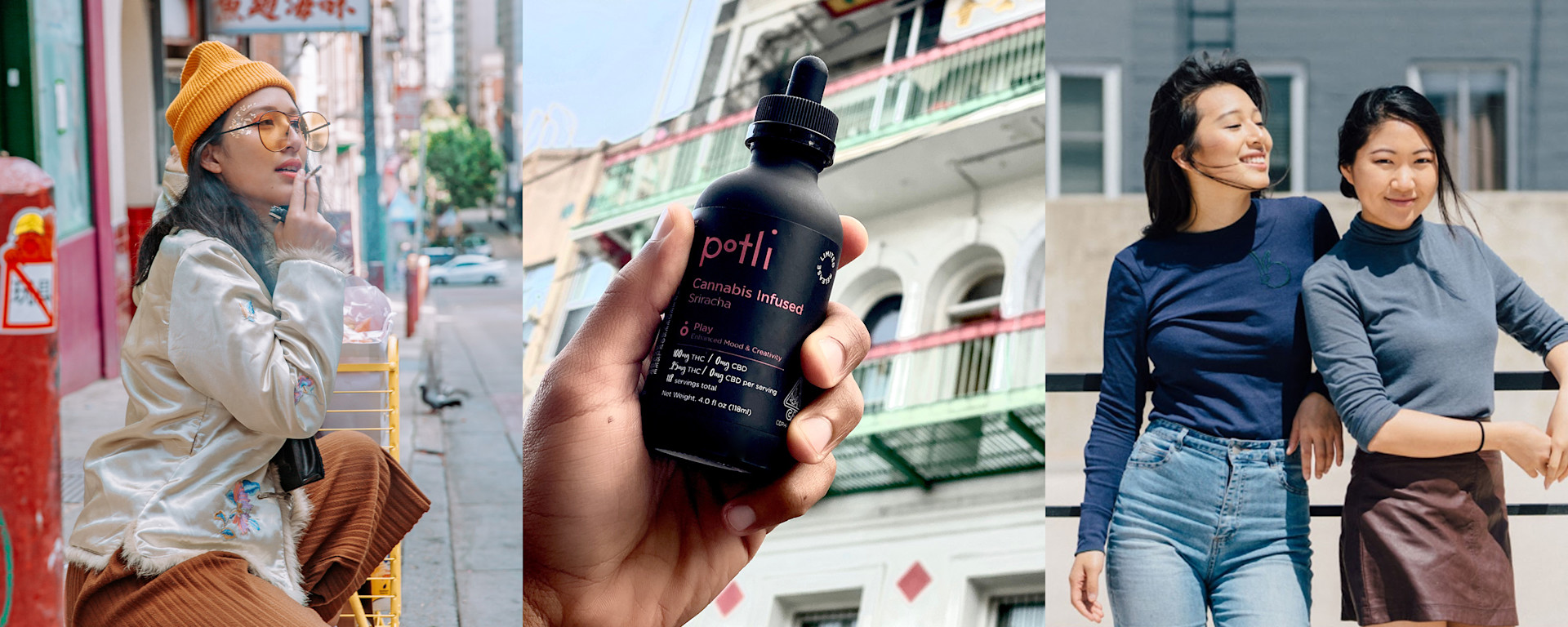
Potli
Potli was founded by college roommates Felicity Chen and Christine Yi by infusing cannabis into raw honey harvested from Felicity’s parents’ farm. The idea was inspired by Felicity’s mother, a first generation immigrant who suffers from an autoimmune disease but was deterred by the stigma around cannabis from exploring its health benefits. The company has since expanded their line to include products that honor the co-founders' Asian heritage.
Sava: How did you get into the cannabis industry?
Felicity: After college, I came home to the East Bay and found that my father had started beekeeping in the name of homeopathic medicine to cure my mother’s autoimmune disease. My father harvested hyperlocal honey, which contains antihistamines to treat my mother’s allergies and help regulate her asthma. It was at home, with my family, where I grew up observing the importance of food as medicine. You can really imagine my childhood! This lens built the foundation of our company, and we have made it Potli’s duty to share the idea that food can also be medicine with the world.
Sava: Do you encounter any stigma for using cannabis or being in the industry?
Felicity: Being a young, female, and Asian entrepreneur, I stick out. I've always used this to my advantage though and I am lucky to bring in a fresh new perspective. It's 2021, and by now people understand that representation matters. I've had to challenge perspectives but also I fundamentally pull my weight and always aim to surprise and delight.
Sava: Any thoughts on the intersection of the AAPI identity and cannabis?
Felicity: Totally, that's what we are doing here at Potli. We want to take those nostalgic moments and ultimately normalize them through elevating the classics. Through these products we aim to define who we are as high functioning, bad ass individuals.
Try our favorite Potli products:

Mellows
Crafted in San Francisco by founder and chief confectioner Stephanie Hua, Mellows produces gourmet marshmallows infused with full-spectrum, solventless ice-water hash.
Sava: What’s the relationship between Chinese culture and cannabis?
Stephanie: Plant medicine has been used in Chinese culture for centuries, however cannabis use is still pretty taboo. One of our guiding missions is to destigmatize and normalize cannabis, and that can only really happen through education and open conversations. As a first generation Chinese-American, I think it's important to push those conversations if we are to bridge the gap across cultures and generations and shift perspectives a little at a time.
Sava: Tell us about your AAPI-inspired products!
Stephanie: One of my favorite limited edition flavors of past was our Black Sesame Mellows! They were made with toasted ground sesame seeds and a touch of sesame oil for an aromatic flavor that was deeply sesame. These garnered a cult following and even took home an Emerald Cup award the year we introduced it!
Our Black Sesame Mellows were inspired by one of my favorite Chinese desserts -- tang yuan. Tang yuan are mochi-like balls made of sweet glutinous rice flour and stuffed with fillings like black sesame, red bean, and peanut paste. Growing up we always had black sesame ones, served in a bowl of syrupy ginger soup. It was always a big treat whenever my mom made these for us, as "dessert" was typically just fresh fruit!
Try our favorite Mellows:
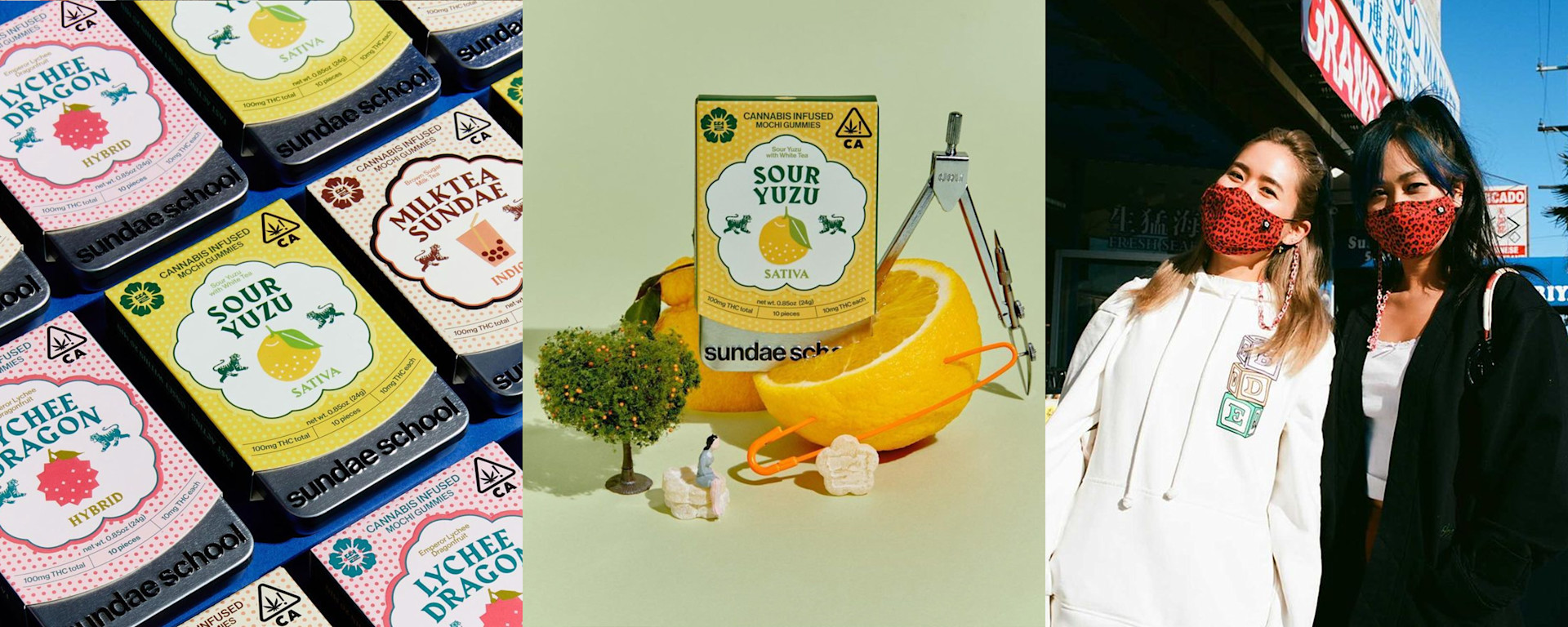
Sundae School
Founded by Korean immigrants Mia Park and J Tran, Sundae School is a cannabis and streetwear brand with a mission to elevate minority voices in the cannabis space.
Sava: Tell us about your AAPI-inspired products!
Mia and J: Our brand is integrally inspired by our Asian heritage and cannabis. We love the creativity that cannabis inspires to our R&D process all the way to our Korean Smokewear fashion line.
Our pre-roll packaging has our AAPI heritage all over and we are especially proud of our new mochi gummies. The gummies are inspired by our childhoods going to asian supermarkets. When deciding on the flavors we made sure to be true to flavors we grew up with in Asia and the bay area. Right now we have Lychee Dragonfruit, Sour yuzu and we just launched boba milk tea :)
Sava: How did you get involved in the cannabis industry?
J: I started my career in experiential marketing and community outreach so cannabis was the natural next fit. When my childhood friends started sundae school as a fashion brand in New York, it was a no brainer I would join them when they brought that vision to California cannabis.
Sava: Have you encountered any stigma from AAPI communities for working in cannabis?
Mia and J: Speaking of hurdles, I'm sure as you know, the cannabis industry is no joke. My guess is that we are not the first to tell you that launching a new product in the canna space seems to have challenges in every step of its birth. Yet the most lingering challenge for us has been fighting against the prevalent stigma and a systemic lack of diversity in this field. We often feel, as a team of immigrants, that despite the relatively modern nativity of this industry, the cannabis industry still lacks a great deal of diversity and conversations around inclusion. And on the other side, we also face the cold wall of prejudice from our Asian American community against the Devil's Lettuce so we feel squeezed in between those two thick walls! But we are here to topple both walls down and we absolutely have enjoyed every step of this ride so far!
Try our favorite Sundae School products:
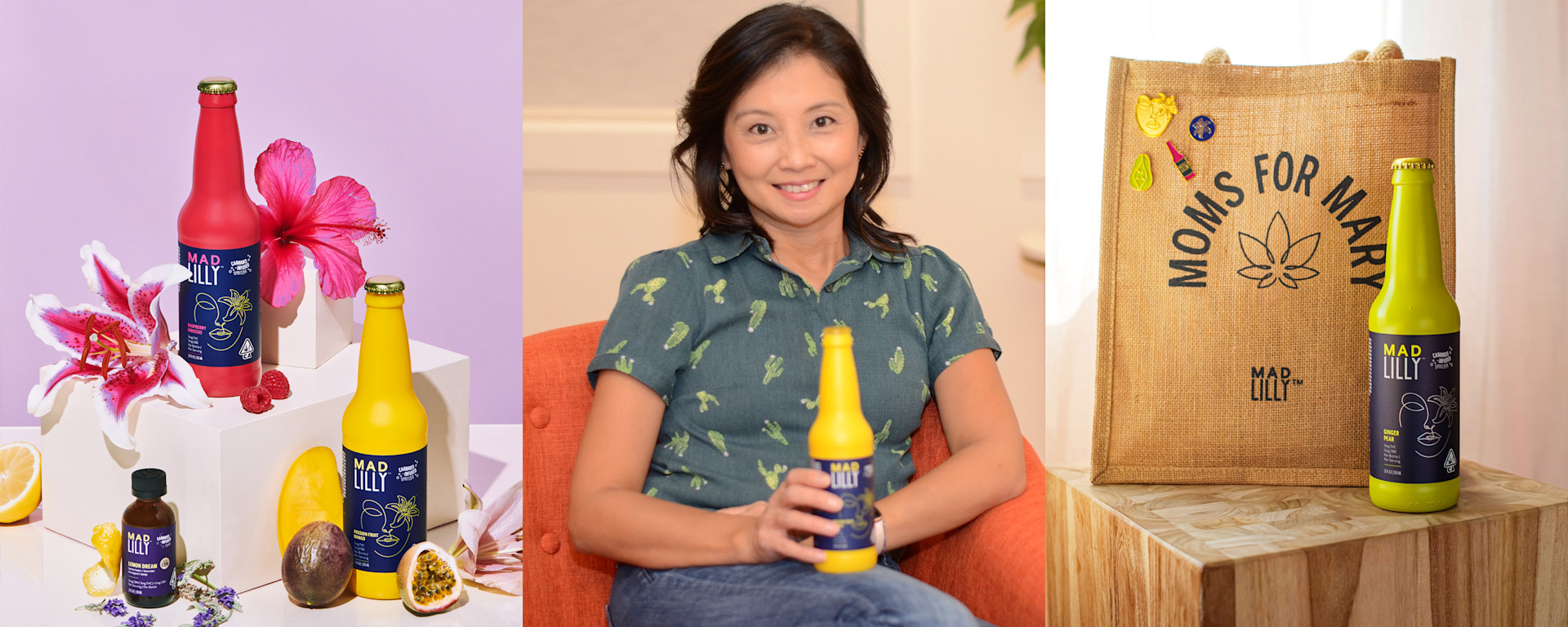
Mad Lilly
Founded by Chinese American Judy Yee, Mad Lilly / K-Zen produces delicious and low-calorie cannabis-infused beverages. They’re known for their Emerald Cup award-winning fruit spritzers as well as their sleep tonic. Mad Lilly drinks are a great entry point for new cannabis consumers due to their easy and low dosing.
Sava: How has your Chinese heritage shaped your experience in the cannabis industry?
Judy: As a first generation Chinese American, I was born in Taiwan and my family emigrated to the States when I was young. My father is an ex-military officer and we grew up in a fairly conservative household where I had to overcome many cultural differences. He strongly believed in President Reagan’s war on drugs campaign “Just Say No,” so I had a very negative, but false, perception of cannabis?—?including its effect on people and the image it projected on those who used it.
When I left my thriving CPG career to start a cannabis beverage company in 2018, I was most scared to tell my conservative parents. I finally found the right moment to tell my mom on one of my trips home as we prepared dinner together. The Chinese word for cannabis is a bit crude (it’s pronounced as “da ma”) so I was looking up other alternative words, but there simply wasn’t any. So I mustered up the courage to finally tell her what kind of drinks my company was making. To my surprise, she reacted with curiosity and asked a lot of questions. It quickly turned into a “Cannabis 101” discussion where we both came away feeling even more connected and supported. Although my mom hasn’t been able to try K-Zen’s products (she lives in WA and interstate commerce is not yet allowed in cannabis), she has now incorporated cannabis topicals into her self-care routine.
One of the greatest joys I’ve had is seeing my mom’s generation accept cannabis as part of their self-care routine, and use it to help treat real medical needs. If long held negative perceptions can be reversed by my elders in the AAPI community, anything is possible!
Sava: Are any of your products AAPI-inspired?
Judy: I like to think that all of our products are AAPI-inspired. And that starts with our company name, K-Zen. K-Zen draws on the Japanese term, Kaizen which means continuous improvement in all aspects of life. This ethos is what drives us to bring the highest quality, best tasting and most consistent products to market for consumers.
Sava: What’s your company vision?
Judy: We are committed to removing the stigma and improving the accessibility of cannabis with different types of cannabis beverages that are a healthier alternative to smoking, vaping or sugary edibles. Beverages as a form factor for cannabis can be helpful in removing the stigma around the plant because drinking is already a socially acceptable consumer behavior. More specifically, our Mad Lilly products are designed for the cannacurious or those consumers who are looking for a low-dose, 1:1 experience for themselves, their parents or others in their circle who could benefit from a refreshing beverage and a bubbly buzz (with no hangover). Starting the cannabis conversation with more conservative family members around a beverage is much easier than with a joint or bong.
Try our favorite Mad Lilly drinks:
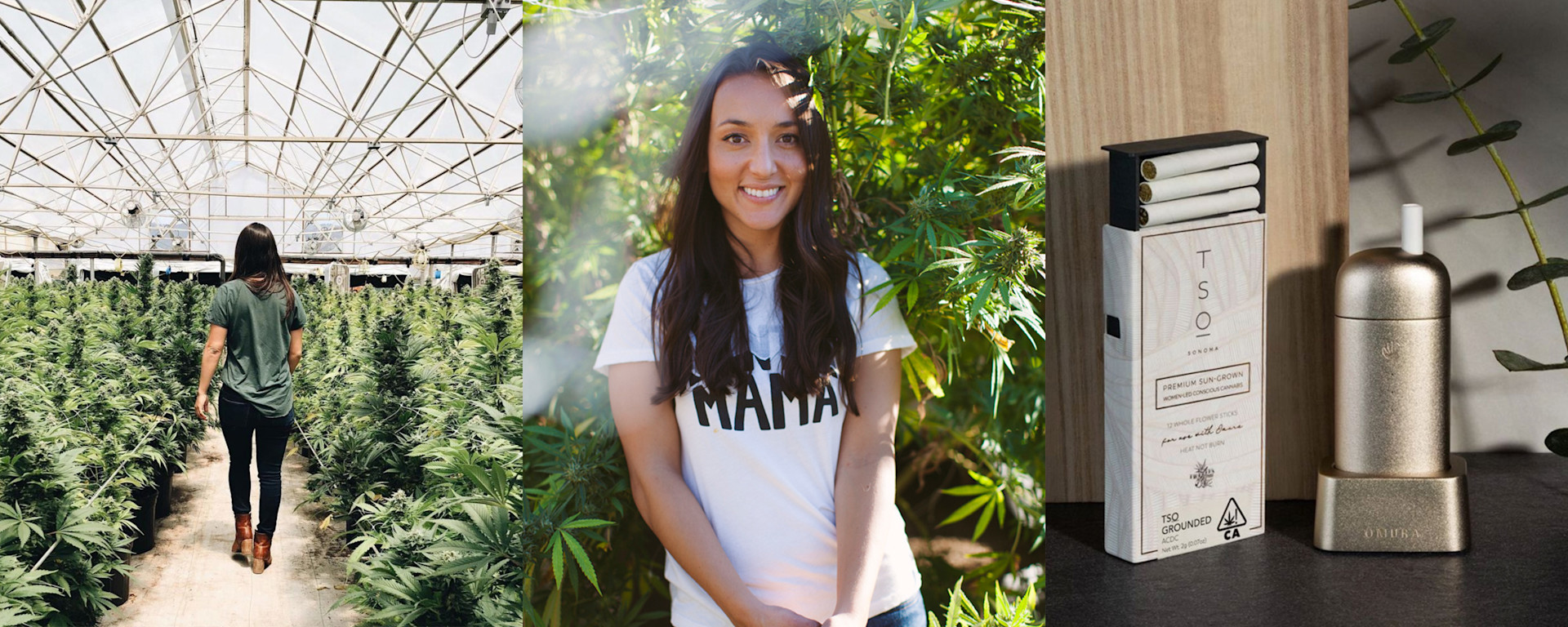
TSO Sonoma
TSO was founded by Devika Maskey to merge sustainable sun-grown flower, artful design, and an inviting community for a modern and sophisticated cannabis experience.
Sava: How has being Nepalese shaped your experience in the cannabis industry?
Devika: I am a Nepalese immigrant and (as far as I know) the only Nepali cannabis CEO in the US. Cannabis has a deep history in my culture. In the small village where I grew up in Nepal, there were no roads, running water, or electricity. Every home made sure to have two medicinal plants- a cannabis plant and a lemon tree.
Nepal was famous for cannabis and hash in the 1960s. However the war on drugs in the US spread to Asia as well and “marijuana” was outlawed in 1976 after being pressured from the US government (Nixon administration) because too many American hippies were visiting Nepal for cannabis tourism.
It pains me to know that a medicinal plant so entrenched in Nepalese culture and history is criminalized by the government and that you can go to jail for 3 years for being caught growing it.
My father, who still lives in Nepal and I are actively working on creating educational materials for the Department of Health to lobby for the legalization and decriminalization of cannabis once again.
Sava: How did you get into the cannabis industry?
Devika: I became sick of the misogynistic bro culture around cannabis and decided to start a brand that spoke to me as a female consumer. In 2017, I founded TSO Sonoma, a women-led conscious cannabis brand dedicated to reimagining well-being through products and events.
Sava: Tell us about some of TSO Sonoma’s initiatives.
Devika: Our TSO Elevated Event series was created to de-stigmatize cannabis and show people that cannabis can be experienced and enjoyed just like wine. The event series garnered a lot of national press and we elevated the cannabis experience by collaborating with farmers, Michelin star chefs, and beautiful Wine Country venues.
Try our favorite TSO products:
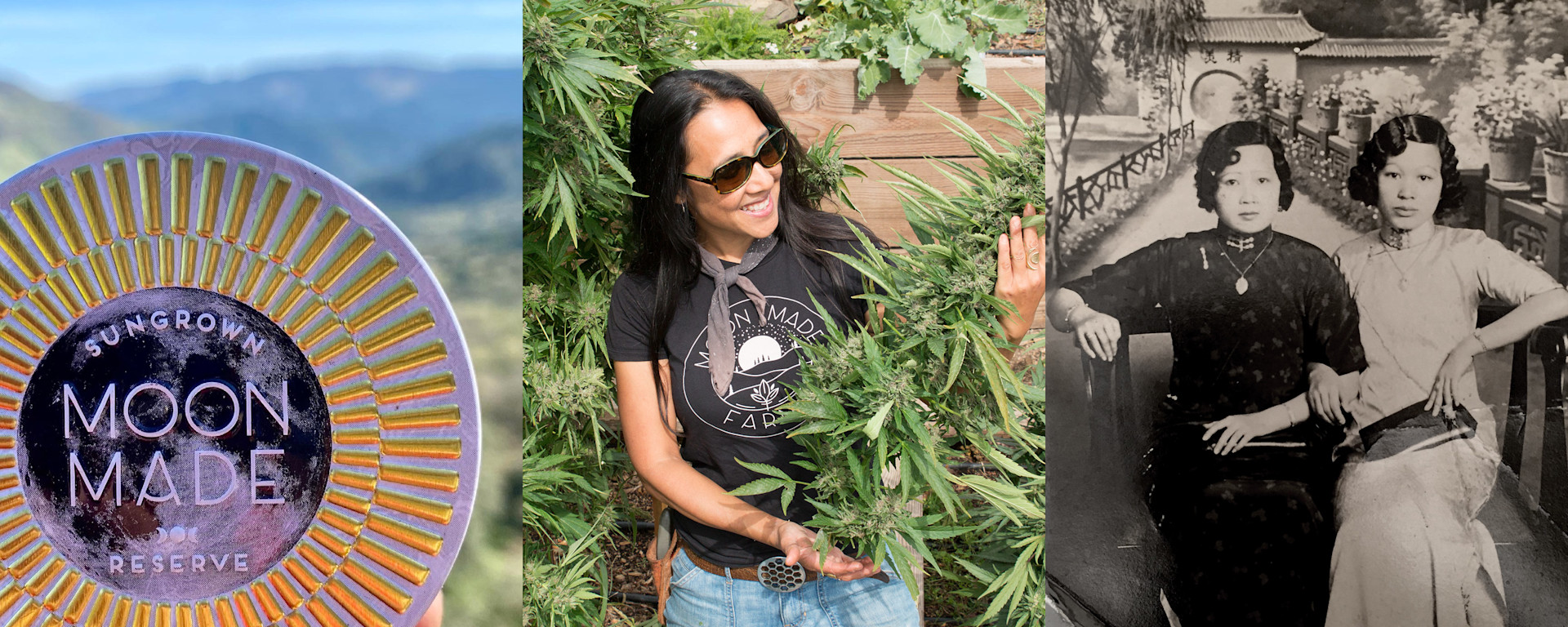
Moon Made Farms
Moon Made Farms was founded by Tina Gordon, a traditional cannabis farmer and advocate for increased access to healthy medicine produced in alignment with nature. Her farm is located in Southern Humboldt Valley and produces Sun + Earth Certified flower.
Sava: How would you describe the relationship between the AAPI identity and cannabis?
Tina: A diverse culture is a healthy culture. From her origin in Central Asia, Cannabis has a legacy symbiotic relationship with people across the globe. I'd love to see more women, AAPI, and BIPOC folks participating in cultivation and ownership roles in this emerging industry as a true reflection of this plant's lifeline.
Sava: Do you have any products that are AAPI-inspired?
Tina: My Chinese name means Celestial Heart so there's a little piece of this name in all of Moon Made Farms’ products. From lunar farming to bringing every product back to the balance between the Sun and the Moon, the Celestial presence led with heart is what our brand is all about.
Sava: Have you encountered any stigma from AAPI communities for working in cannabis?
Tina: I didn't talk with my Chinese family about cannabis for many years. This was partly due to fear, judgment, or a possible negative reflection upon my mother who has held the identity of being the family rebel for marrying a radical Jewish artist. This consideration was also based upon not wanting my Chinese family to worry about me being involved in Cannabis. This has shifted, during the last family gathering more than one cousin inquired about the farm from across the banquet table! I felt a great sense of relief and pride in what I do.
Try our favorite Moon Made Farms flower:
-
Grease Monkey Flower for an intense high
-
Bonkers Flower for a calm, euphoric effect
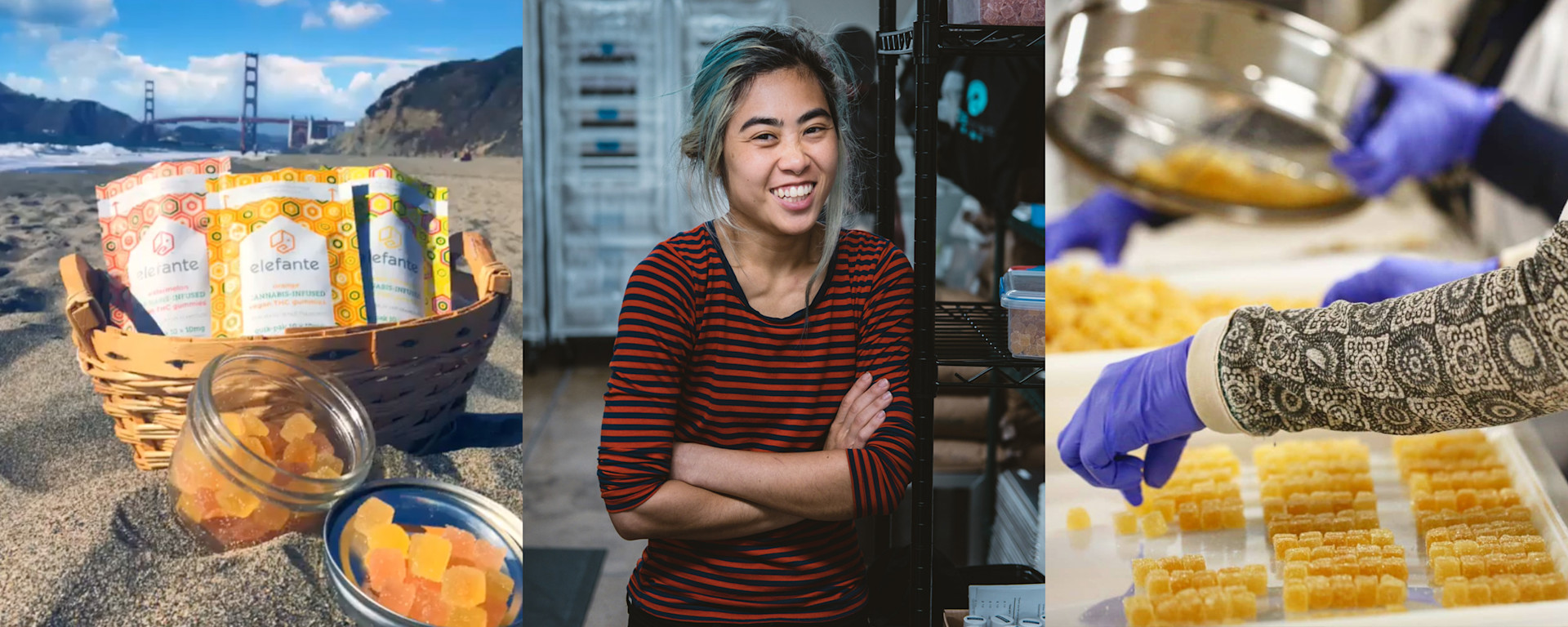
Elefante
A woman- and Asian-owned business, Elefante produces mouthwateringly soft vegan gummies. Named after founder Julie Tran’s dog, Elefante’s all-natural gummies are great for the vegans and non-vegans in your life alike.
Sava: How did you get involved in the cannabis industry?
Julie: I went to a medical high school because my parents wanted me to be a pharmacist. I had only tried smoking once at that point, and I didn't get high so I didn't think much about cannabis at that age. I was really into sweets and was writing a note to my friend about some day having a pharmacy bakery that would infuse sweets with pharmaceuticals. You can see on my note scan that it was written on that three-hole notebook paper, and my friend asked about weed edibles. I was recently reunited with this note after I had started Elefante. I didn't fulfil my parents' dream of becoming a doctor, but I'm very grateful to be able to help people through cannabis.
Sava: Have you encountered any stigma from AAPI communities for working in cannabis?
Julie: I used to hide my involvement from my family because they were quite conservative. Over time, my parents have become more open-minded and understanding. It was rough in the beginning, especially since my parents found out by accidentally eating very strong gummies (40mg THC) meant for my older brother. My brother came over and found them wandering around the garden. My mom said she was high for 2 days, and my dad said when he ate a banana it was really good. Long story short, my dad was easier to convince of the benefits proven through studies, and my mom is straight-edge so that has taken work, but now even my extended family know, and everyone has been supportive. I'm immensely thankful that my parents and I have grown to where we can be open about cannabis. If this had happened 10 years earlier, they would have disowned me. I'm sure many people can relate struggling to overcome our childhood programming and building the confidence in ourselves that we aren't losers. Now my pops takes a gummy for his lifelong insomnia. These days, they mostly worry about the possibility of me getting into legal trouble which hopefully will be a concern of the past soon!
Sava: Do you have any products that are AAPI-inspired?
Julie: We are collaborating with Sundae School, an amazing progressive Asian cannabis fashion brand. So far, we have launched 3 gummy flavors: yuzu white tea, lychee dragonfruit, and milktea boba. They are cute little mochi gummies in the shape of the Korean hibiscus.
We're excited to develop more AAPI-inspired flavors we grew up with and to have the opportunity to share with everyone. We strive to educate others on these different flavors and give insight to the culture attached to them.
Try our favorite Elefante gummies:
-
Vegan Watermelon Gummies for socializing
-
Vegan Orange Gummies for a mild, serene high
-
Vegan Pineapple Strawberry Gummies for a smooth, calming experience
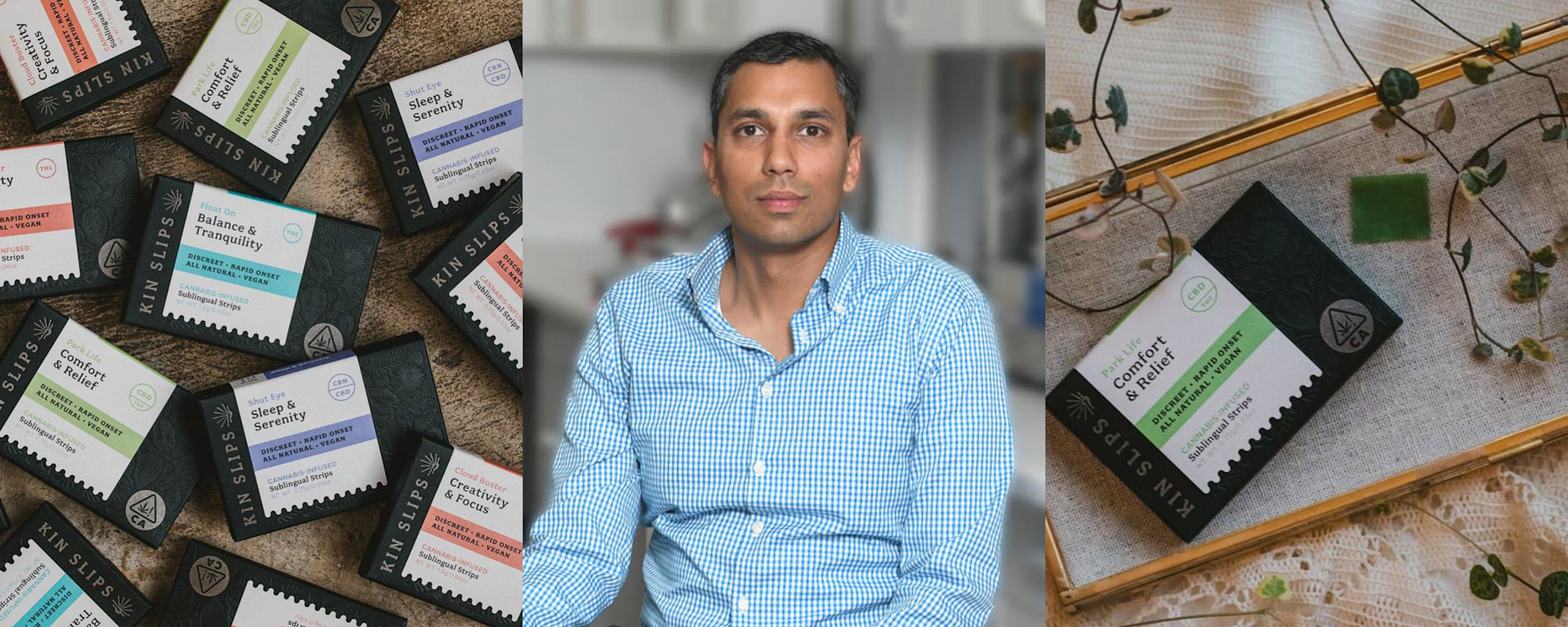
Kin Slips
Led by CEO Andrew Lobo, Kin Slips is known for their sublingual strips—small cannabis-infused sheets that melt in your mouth for a discreet and fast-acting experience.
Sava: How has being AAPI shaped your experience in the cannabis industry?
Andrew: Certain AAPI cultures have longstanding histories and cultural traditions with cannabis - it sometimes gets overlooked that cannabis’ origins are generally traced to South and Central Asia, where terms such as ‘ganja’, ‘bhang’, and ‘hashish’ come from. As more AAPI talent influences the industry, and as global legalization trends continue, I think there will be more spotlight on the rich history and origins of cannabis in Asia and the elements that have been carried over by the AAPI community to the U.S.
It’s been great to see more and more AAPI leaders emerge as the industry develops – this industry needs entrepreneurial leaders who are passionate about cannabis, and the AAPI community has many to contribute. I am proud to be part of the AAPI community and am always looking to network with and mentor future AAPI leaders in the cannabis industry.
Sava: How did you get into the cannabis industry?
Andrew: My favorite hobby is gardening, and I love plants. The cannabis plant is my favorite because it has the power to help so many people in so many unique ways, and we’re only just beginning to learn about its true potential. From the moment that I heard about states legalizing adult-use cannabis, I knew that I wanted to be a part of a movement. After spending many years in less exciting corporate roles, I took the plunge in early 2019 and joined the industry – it’s been an amazing ride so far. I love coming to work in this industry because every day I get to be creative, resourceful, and collaborative while knowing that my efforts are making the world a better place.
Sava: Anything you’d like to add?
Andrew: At Kin Slips, when we say, “We’re All Kin,” it’s more than just a fun phrase. We’re an organization that empowers and embraces diversity and we are active members and advocates of multiple communities, including the AAPI community.
Try our favorite Kin Slips products:
-
Shut Eye slips for sleep
-
Cloud Buster slips for energy
-
Park Life CBD slips for pain and calm
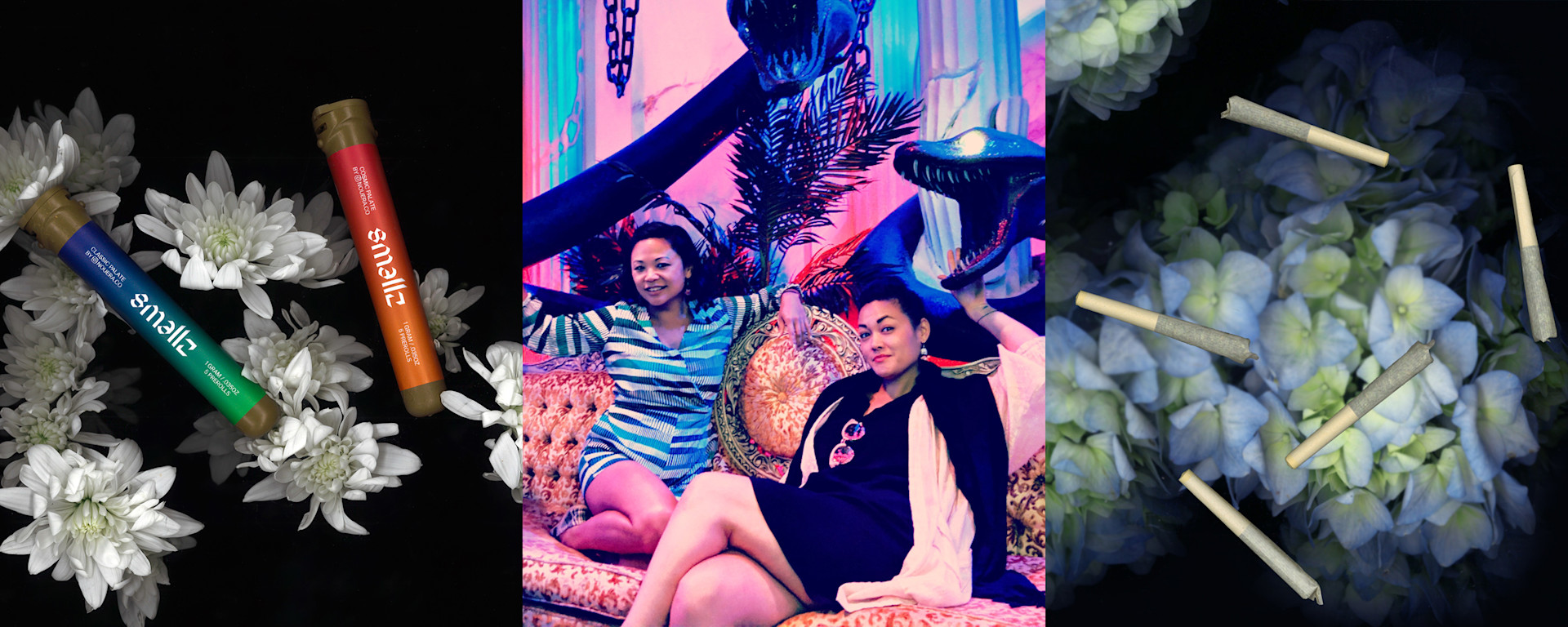
Nouera
Nouera is an Asian American-founded cannabis brand known for their Smallz line of fun-sized pre-rolls that weigh in at just 0.2 grams to make "sharing is caring" fun again.
Sava: How would you describe the relationship between AAPI cultures and cannabis?
Cynthia & Jessica: Cannabis has been grown all over the world and on ships crossing oceans for thousands of years. The oldest history of the plant can be traced to Asia and it’s illegal stance is due to the US War on Drugs campaign. It’s our duty as Asian Americans to educate our community on the historical lineage of this plant and how we’ve used it for thousands of years for its durability in textiles, its medicinal value, and now, how to consume it mindfully to work with our own bodies needs.
We spend a lot of time championing for our community - creating gatherings, providing educational materials, speaking up against injustices, political organizing and mobilization. The illegal status of cannabis in Asia is a direct result of the US War on Drugs, which is a creation from US racism and white supremacy. This plant has been a healing and spiritual medicine in Asia for over 5,000 years and the Chinese book of medicine has had it listed for hundreds of years as treating the ailments western science is now “proving” it heals. You won’t find that information in recent copies. Too many people aren’t aware of this important information. It is crucial for us to reclaim our history, especially since mass ignorance of it, and fear of this plant, was intentional harm to keep us from healing and connecting.
Sava: How did you get into the cannabis industry?
Jessica: I tried cannabis in college and it was so strong it knocked me out and I didn’t try it again until I was almost thirty. A friend offered me a joint one evening and I ended up sleeping better than I had in years - it changed my life. Up until then I had suffered from chronic insomnia and tried every over the counter and prescription pill available. Cannabis helped me sleep with no bad side effects the next day and that was revolutionary for me in my life. Cannabis has helped me balance my life through better sleep and more grounded presence.
Cynthia: I first consumed cannabis in high school, and enjoyed the relaxed giggliness that was shared amongst my friends when we got elevated together. Now consuming it as an adult, I’ve also incorporated cannabis into my meditation and embodiment practices to gain a better awareness of my connection with the universe. Cannabis strains that contain the peppery and earthy tones like our smallz classic palate assists me in grounding myself to this planet and back into my body. I am more attuned to my body’s needs and am able to express myself more genuinely when I tap into my heart center and allow myself to be. Cannabis has been a great plant ally for me in my self development work and I cherish the information I’ve gained from it over the years.
Sava: Do you encounter any stigma, especially in AAPI communities, for using cannabis or being in the industry?
Cynthia & Jessica: Absolutely, we’ve been educating all generations in the Bay Area, including the elderly in Japantown, which are Japanese, Chinese, and Korean, about the health benefits and it has been difficult at times. Many of the older generation and still younger generation are afraid of this medicine and government policing of their access and it can be difficult when folks get really upset and want to shut down the conversation because of their fears, which stem from misinformation provided during the US War on Drugs and years of prohibition and over policing of minorities.
Try our favorite Nouera products:

 First, create your Sava account.
First, create your Sava account. Your $40 discount will apply automatically on your first order.
Your $40 discount will apply automatically on your first order.